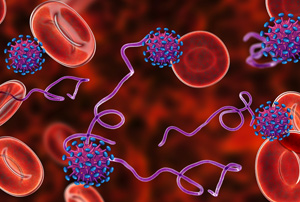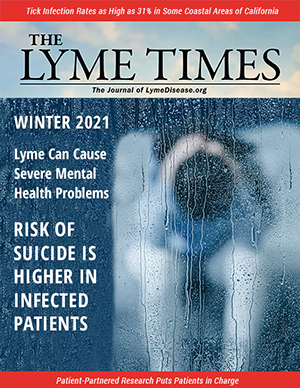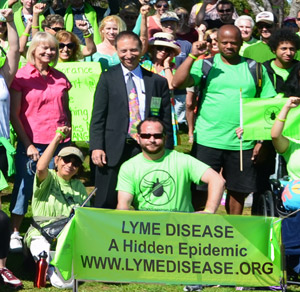- Home
- Find A Physician
- FIND A PHYSICIAN
- LymeTimes
- Current Issue
- Archives
- FEATURED LYMEDISEASE.ORG ISSUES
- Resources
- LYME LITERATE PHYSICIAN VIDEOS
- Physicians
- Members
- About Us
- Resources
N early a generation of medical dogma on Lyme disease may be slowly unraveling as new test tube research shows that antibiotics long endorsed as curative do not kill what scientists call “persister” cells — and may even promote their growth.
The corkscrew Lyme spirochete, known as Borrelia burgdorferi, had been shown in previous research to hide beneath slimy shields called biofilms and shape-shift into “round bodies,” persisters that survive lethal drugs and may repopulate later. But emerging science implicates the antibiotics long used to treat the tick-borne illness, including the predominant doxycycline, as a potential key to persistent infection: While killing most pathogens, the antibiotics commonly prescribed for Lyme disease have been shown in test tubes to leave behind a smattering of remarkably resilient Lyme bacteria. As the bacteria’s growth slows under antibiotic assault, these persister cells increase, sometimes dramatically, three research groups found, providing a plausible explanation for a problem that has bedeviled Lyme disease care.
While most patients are treated successfully with go-to antibiotics, some 10 to 20 percent remain sick.
With an estimated 300,000 U.S. Lyme cases annually, that means 30,000 to 60,000 people every year develop lingering neurological, arthritic or other symptoms, some for months or years. Many are told their symptoms are “subjective,” even psychological, and aren’t tied to Lyme disease…… Join or login below to continue reading.
You must be a LymeDisease.org member to access this content.

2 Reader Comments
Comments are closed.




























I contacted Lyme’s Decease in Ireland some 5 years ago. Unfortunately our Goverment, Health Service and Medical practitioners do not recognise that Lyme’s is contactable in Ireland. In one way I am lucky to have a cousin a Doctor in Scotland where they deal with this decease on a daily basis with students coming off Mountain hiking high up on the Scottish Highlands every weekend. She came to Ireland and visited me within 1 month of my sickness and realised that it was Lyme’s that I was suffering from and with pressure from her my Doctor agreed to let me have special antibiotics but unfortunately they were of little use. They dealt with the bacterial infection but it is the viral infection that has me floored. I now attend a clinic recommended in Scotland which was recommended for me by another Doctor who works with my Cousin on a 3 to 6 Monthly bases depending on the flare up of my symptoms at the time. I live in North West Donegal Ireland and between travelling to Scotland, on going tests and then the medication I require it is very expensive on my family and the result thereof I now suffer with very deep depression on top of everything else.
I sympathise with you. I’ve had Lyme disease for 45 years because the medical system in USA is lazy and has not done their job. Antibiotics do not work for me and they are dangerous. Plus, drug companies overcharge patients of which I refuse to participate in. Insurances in America will not help. Mary, I do believe you can get help without traveling long distance which takes your money away from treatments.
I know of non-drug treatments that can help. Each person is different. If you or anyone else is interested do email me at glycojan@estreet.com. I will send you information.